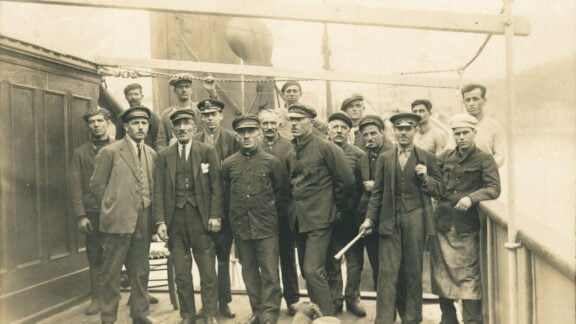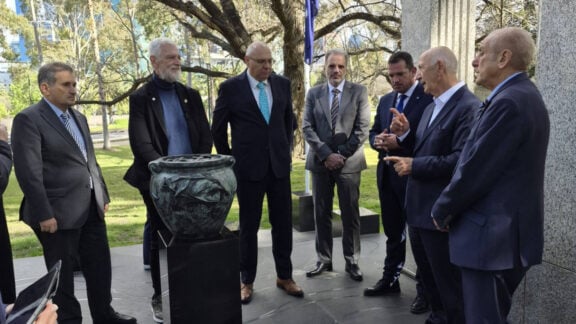“When you’re in serious trouble, you have to do something, you have no choice,” world-renowned brand strategist Peter Economides muses.
That push under very harsh circumstances is helping young Greek professionals to find new and inventive ways to stay afloat in their debt riddled country.
With the unemployment level for the 18-34s still teetering at 60 per cent, the situation has fostered a new age of start-ups and business ventures for the young that stay behind.
Mr Economides, who has helped brands like Apple and Coca-Cola define themselves globally, believes Greece’s young are creating the change that Greece so desperately needs, way ahead of the government’s actions.
“We have a very well educated young population that just can’t find work,” he tells Neos Kosmos on his visit to Melbourne.
“So what happens is you either pack up and leave and go somewhere else, you join Golden Dawn and you get all anti-immigrant or you start throwing Molotov cocktails because you’ve become very angry.”
“But there’s another reaction that comes out of all of this, which is ‘I need to do something’.”
This reality, that being educated and able to work isn’t necessarily going to get you a job, and most probably won’t, has created a new group of Greeks that have to think outside the box, invest in a good idea, and put everything they have into making it work.
They aren’t going to wait for the government to introduce new reforms, they learn to work with what they have, and work the system to their advantage.
In the past couple of years, countless Greek start ups have found global success, making products that aren’t adding to an already saturated market, but filling voids in the consumer world.
Companies like Daily Secret, an app that started out as a direct response to the crisis, giving young people tips on where to go in Athens that is off the beaten track, something to look forward to.
The app/email subscription business has now expanded to 72 cities and is coming soon to Australia.
Greeks aren’t just filling niche markets, they are also creating unique Greek products that add to already well established markets.
COCO-MAT, a company that makes mattresses out of Greek seaweed and cotton, has become a hit in 12 countries and is expanding to more.
The idea came to owner Paul Efmorfidis when he was on a beach in Greece. Annoyed at having to sit on uncomfortable, rough sand, he laid out some seaweed to sit on, and discovered just how comfortable it could be.
“He said, ‘I can’t make mattresses better than Germans or Americans but I can make mattresses only as a Greek can’,” Mr Economides remembers Mr Efmorfidis telling him
In 2012, Mr Economides launched his ‘Ginete’ campaign, to create a safehaven for creatives and start ups.
Although the idea hasn’t seen the implementation phase, Mr Economides has fostered a smaller project with the help of the Dutch Embassy in Greece.
The project, called Orange Grove, started out as a way to foster better relations with the Dutch and the Greeks, but doing it in a very constructive way.
The project, set up in a 400 sqm space in the Dutch Embassy, sees more than 37 start ups working alongside each other, being offered mentoring from both Dutch and Greek professionals, and links them to financial aid from big business.
The Dutch government is so impressed with the initiative that it’s looking to introduce Orange Groves in other embassies around the world.
“I go there and give talks every few weeks, they bring in people from Dutch universities, we do a ‘Dragons Den’ every few weeks where we just pull these kids to pieces, we marry them up with finance people, I mean it’s a really good incubator,” Mr Economides says.
He believes the initiative answers a big need, something that the Greek government has been slow to encourage.
Fostering these hubs will create a brand new, creatively mature nation, and will open up trade options with countries and their businesses.
That is where Mr Economides believes the disapora can be very useful. Creating business connections with these start ups won’t be charity, but rather a mutually useful tool for companies to expand into a European market.
He is already seeing a shift with big Greek companies, who are adapting to their shrinking Greek market share and are looking to global markets to supplement their brands.
‘I think they’re realising that it’s not a question of taking a Greek product and simply going and selling it abroad, they have to really take something and which will have demand and real consumer relevance assured,” he says.
“Well-established Greek companies, who are very good at doing what they’re doing now turning seriously and looking at global markets.’
The only concerning factor for Mr Economides is the mass exodus of young Greek creatives. The lack of opportunities in Greece has seen thousands seek better fortunes in more stable countries like Australia and the US.
The only way he believes the young will feel secure in their own country is to believe in a realistic ideal.
“I think the way to get them to stop leaving is to give them a vision that a young person can buy and say ‘Yes, I believe in that’,” he says.
“It needs initiatives like the Dutch initiative but on a bigger scale.”
He wants to see Greece change its brand and adapt it to a new sentiment.
“We can’t be this ouzo slugging character dancing on the beach, but the spirit of that we certainly need,” he says.
“We’re looking for the descendants of Zorba; what we do that separates the Greeks from anyone else are all those elements of focusing on life.”
Mr Economides was in Melbourne this week and hosted two events for the Hellenic Chamber of Commerce and Industry (HACCI). He will be back in Melbourne in September to launch the Benaki Museum collection at the Hellenic Museum.








